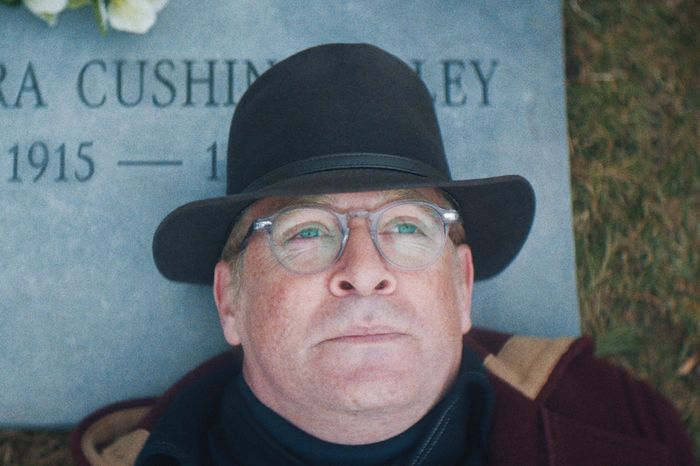
This interview was published on March 3, 2024. Feud: Capote Vs. The Swans has since received 10 nominations for the 2024 Emmy Awards, including an Outstanding Lead Actor nod for Tom Hollander. Read all of Vulture’s Emmy-race coverage here.
Ryan Murphy projects are not known for their subtlety. Then again, neither was Truman Capote. The pairing of creative lead and subject for FX’s Feud: Capote vs. the Swans could have simply combusted into a dramatic flurry of feathers if it weren’t for the performances: a flock of iconic actresses as the high-society “It” girls on the end-of-the-mid-century Upper East Side and Tom Hollander as the odd duckling among them, equal parts record-keeper, confidant, tableside entertainment, and saboteur. Capote has been done before, but Feud skips past the In Cold Blood and Breakfast at Tiffany’s eras to zero in on the years and relationships that led to his death and an unfinished final work, Answered Prayers. These relatively unexamined grounds give Hollander room to make Capote his own, portraying the slide from his highs (the Black and White Ball) to last moments racked by alcoholism. What’s miraculous about Hollander’s performance isn’t the way he embodies Capote’s famously specific mannerisms and voice but how he averts getting lost in the showier elements of his transformation, finding depth, insecurity, defiance, and a haunted soul in what could have been a distractingly mannered work of imitation.
Your performance as Truman is so captivating. We don’t see a character like this as the lead very often.
Yes, why is that? It’s probably because the character was such a singular human being. I did wonder whether he was too strong a flavor. To be with someone for eight hours is a lot. But Ryan and Jon Robin Baitz wrote it brilliantly. They told you the whole plot in episode one, then retold it in different ways. Not in a Rashomon way but with different conceits, different ideas, spinning around the plot.
What were some of those different ideas that guided you?
The story is about love and lost friendship. It tries to be about forgiveness at the end, but it’s a fantasized forgiveness because it never happened. It turns into a fantasia.
How did you get into the physicality of the role and play it in a way that wasn’t distracting?
I had to find moments where I could be still. There’s a lot of movement in Truman’s physicality — too many hand gestures, too many eye movements. That’s very difficult to watch, so you have to find moments where it would stop. He was obviously very good at telling stories, which he does on Dick Cavett and all that. He’s got his shtick down, his persona. I could only play the scenes if I was in that persona. You construct it, making choices about gestures; there’s a little pop he used to do with his hip, which we worked on, where he changed his weight from one foot to the other. You learn it all and then you have to forget about it and play like a little kid. You go, I’m Truman Capote! I’m walking into a room and I’m doing this, just like if you were a child and you went, I’m a wizard and I’m going to cast a spell! It’s not very grown-up.
How did you approach playing drunk so convincingly? And re-creating widely seen footage of Capote, like those talk-show interviews?
The Stan Siegel one was tough because I did have to do an impression. I mean, we’ve all been shit-faced. Not on television, but … that one was the hardest because it was a verbatim transcription of the appearance. Also, he is so fucked up, and his timing is of a completely fucked-up person. He spaces out. He pauses — and the pauses go on forever and ever. I copied it as best I could.
What was the most difficult thing to film overall?
I was very, very nervous about the scene of him telling the story of Ann Woodward at the dinner table in Jamaica, holding the table rapt and then they all give him a round of applause. It was in the first episode, but we didn’t shoot it until the end. It’s not a particularly extreme scene. I don’t mind extremity; it’s harder to just be ordinary, and Truman’s never ordinary. As bizarre as he was, he had to be relatable, and you had to be able to see into his heart. You had to remain a human being.
With the long anecdote at the dinner table, you can see the rest of the cast staring at you, acting very interested in you. And you know they’re all interesting people themselves, but you have all the lines in the scene. And that’s unfair because there’s 15 people having a very boring day having to listen to me and then there’s one actor who’s got all the stuff to do. It’s more fun when everyone’s got a bit to do.
How about all of your scenes with the Swans at La Côte Basque?
With traditional shooting, you go around the table and everybody gets their take. It’s very laborious and takes a long time getting everyone’s individual shot in wide and close-up. But Gus Van Sant and Jason McCormick, the DOP, did it brilliantly. They would swirl the camera around, keeping it moving, so we didn’t do that many takes. You weren’t even sure whether the camera was on, so you just had to play. We got to know each other, meeting as actors around those tables. We’d play the scene, they’d watch it, then we’d all go away, sometimes for an hour. When we came back, they would have found a place to put the camera on a spinning dolly and then it would move around the room. It was fascinating to watch. They were very sensitive to the art of being on a person’s face who’s not speaking — the one who’s listening.
How was working with Gus Van Sant?
He is a very confusingly passive presence on a set. Many directors say a lot, but Gus was very quiet and didn’t say very much at all. And occasionally, when he did speak, it would be quite vague. He’d give a note like, “I don’t think the scene is like that. I think the scene is like this.” Otherwise, he would let us all run and then he would go, “Are you happy? I’m happy. Let’s move on!”
I spoke to a much more experienced actor friend a few weeks ago, and she said that all the great directors don’t say anything. I don’t know whether that’s true or not — she’s worked with more great directors than I have. He’s a very sensitive man, a painterly man. Sometimes he would look at the scene like he was looking at the canvas. He’s old enough to have known the characters’ world, the Studio 54 world. And he’s done a lot of work on addiction with films like Drugstore Cowboy. He knows how to film intoxication and self-destruction. And he’s a gay man. He had absolute authority without having to say anything because he knew this stuff. When he did say, “That doesn’t feel right,” you knew he meant it.
This show captures the romance and heartbreak of platonic friendship, and that’s based entirely on your chemistry with Naomi Watts as Babe Paley. How did you develop that with her?
I credit Naomi with that. She was very aware of how close we needed to feel right from the beginning, and she was very careful to make me feel welcome as a producer but also as a New Yorker. I was a tourist, and weeks before we started rehearsing, she invited me over to her house. We hung out and found all of the people we knew in common. It was one of those things where you’ve got to be friends because that’s what the job is, but you end up friends anyway.
What surprised you most about working with these legendary actresses for the first time?
I felt like I won a competition. They all surprised me because people are never who their public image projects. You get to discover the human being that lives behind the image, and the moment you see the vulnerability of someone who’s famous, you feel a sort of privileged view of humanity. Fame makes everyone nuts. It makes the people who are famous go nuts, but it also makes the people who aren’t famous lose our shit around them. It’s a silly human weakness that doesn’t do anyone any good. When you’re working with someone, you get to really meet them because the third element in the room is this separate entity: the work itself. It’s like when you’re on a road trip with someone and you’re talking about the journey and you’re both facing forward — that’s when you really get to know people.
Feud comes right after your supporting turn in The White Lotus, in which you also played a gay man who uses and betrays a female friend. What is it about these roles that interests you as an actor?
I see the line of connection you’re drawing between them: their relationships with women. But I also played a character in The Night Manager who was gay and he barely had a relationship with a woman in that. I played Dr. Burgess, who was one of the Cambridge spies, years ago. I played Lord Alfred Douglas in a play about Oscar Wilde once. So the line of connection really is that I have been asked many times to be gay characters because something about it works when I do it. I don’t know why. It’s afforded me the opportunity to play some really extraordinary people. But the White Lotus character and Truman Capote both having complicated and possibly destructive relationships with extraordinary women is a coincidence of timing.
Have you seen Bowen Yang’s Capote impression on Saturday Night Live?
No, I heard about it, but I haven’t seen it. Not intentionally — I just haven’t gotten around to it.
It’s less an impression of Capote and more of your Capote.
I don’t think that makes me want to see it more or want to see it less. I’m just thrilled that they did it and that for a few weeks Feud has caught the Zeitgeist. It’s a lovely feeling after all the work that everyone involved has put into it. It’s a great compliment. Whether I really want to see someone doing an impression of me doing an impression of someone else on Saturday Night Live …
What do you think it is about Capote’s story that resonates today?
You see that Truman’s an outsider. It was so hard to live the way Truman did in that time. Even though it’s about fancy people, it’s also a story about marginal people. Truman was a warrior and a little bit of a martyr. Obviously, he could be very cruel, and mean as hell, but there are reasons for that. A lot of that was self-defense. He had not received a whole lot of love in his life, so he didn’t really know what that was. He was a gay man living in a time when it was very hard to be gay, when it wasn’t legal, when there was a high chance you’d get the shit kicked out of you. He survived through all of that — and did get the shit kicked out of him regularly. He’s magnificent for having gotten through it, but it also cost him dearly.
This interview has been edited and condensed.
More From This Series
- Feud’s Chloë Sevigny Wants Hollywood to Read More Books
- Feud: Capote vs. the Swans Series-Finale Recap: Epilogue
- Feud’s Molly Ringwald Is an Answered Prayers Truther


